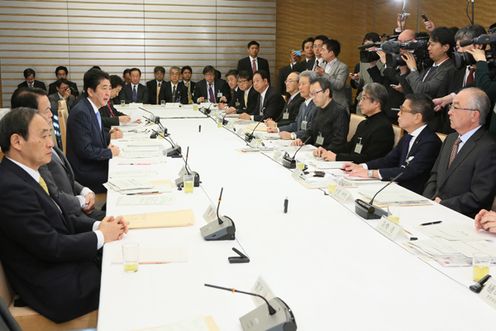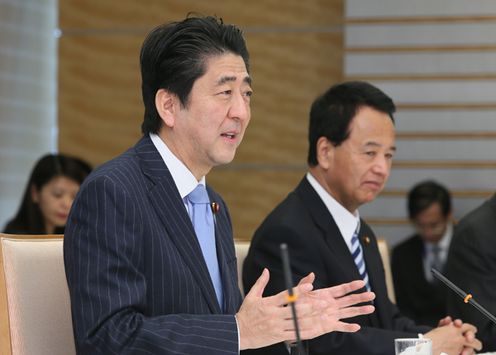Home > News > The Prime Minister in Action > November 2014 > Government-Labor-Management Meeting for Realizing a Positive Cycle of the Economy
Government-Labor-Management Meeting for Realizing a Positive Cycle of the Economy
Wednesday, November 19, 2014

Photograph of the Prime Minister delivering an address (1)

Photograph of the Prime Minister delivering an address (2)
Prime Minister Shinzo Abe attended the third Government-Labor-Management Meeting for Realizing a Positive Cycle of the Economy in 2014 at the Prime Minister's Office.
During the meeting, there was a hearing on examples of initiatives, and a report from the Working Group for the Reform of Ways of Taking Leave.
Based on the discussions, the Prime Minister said,
“I have three points I would like to make based on the discussion today.
First is the improvement of productivity in the service sector and among small- and medium-sized enterprises (SMEs). It is right now, in particular, when the labor supply and demand situation is tight along with the economic recovery, that there is a chance to thoroughly create an environment in which wages can be raised, even in the service sector. I expect labor and management to cooperate together on initiatives for this.
At the end of this year, if the outlook is good for an increase of wages, we will make great progress toward the second revolution of the positive cycle. In my press conference yesterday, I promised the public that we would create an environment in which wages will rise next spring, the spring of the year after that, and again in the spring two years from now. As such, I would like to thoroughly advance that by utilizing Government-Labor-Management Meetings. High-profit and large export companies are receiving the benefits of the cheap yen, and as such, they are now being looked to for positive responses such as increases in the total wage payments and capital investments, and the transfer of cost increases at cooperating companies to prices. I would request everyone’s assistance with this.
My second point is on the reform of work styles. We should not be limited by conventional eight hours per day five days per week work styles. There should instead be a variety of work styles in order for employees to exercise their individual creativity. In order for people to exercise their creativity, we must think about the ways people work. From Mr. Matsuoka, we heard about Kunisaki Time. I think this is a good idea for not only ways of working, but also the vitalization of local economies. I believe that if people are able to lead a fulfilling life by going to Kunisaki, various people from all over the country will gather there and this will give rise to new possibilities. Today I felt how very important it is to take an approach of pursuing ways of work that utilize the unique characteristics of each region. I hope for continued debate between labor and management on this.
At the same time, we should change our custom that looks upon long working hours as a virtue. Building on the proposal of the Working Group, I would like to promote the reform of the mindset about ways of taking leave.
Third is the issue of retraining our knowledgeable elder generation and the supply of human resources for regional companies. I would like for concrete policies to be discussed on the promotion of the smooth shift of the elderly labor force to the regions, with discussion about this centering on the ‘Meeting of the Council on Overcoming Population Decline and Vitalizing Local Economy in Japan.’
Lastly, up to today, there has been a lot of significant discussion in these meetings. I would like to request that your ideas be complied by the end of this year.”

